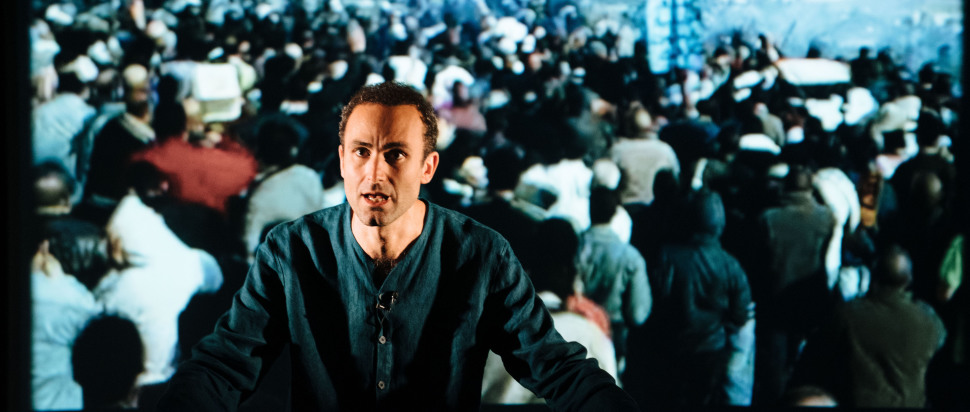Khalid Abdalla on his Edinburgh Fringe play Nowhere
Our Books editor speaks speaks to Khalid Abdalla, the artist behind Nowhere, a show which interrogates, challenges and remembers the meaning of revolution
Can you tell me about the play and how it came to be?
Nowhere is about the intersecting world of crises that we live in, told through the prism of the Egyptian revolution and this moment in Palestine as two major poles of what it is to be an Arab in this world. The play fractures out into colonial histories, personal histories, collective histories, a kind of summoning of political ghosts.
The word nowhere is, at some level, the space of the theatre, but also an inversion of what tends not to be acknowledged in the outside world, and trying to make a space of gathering for it.
What does this summoning of political ghosts mean to you?
The show was first done at the Battersea Arts Centre in October, around the anniversary of October 7 when – I mean, it's still contested – but when the word genocide was difficult to utter inside a theatre. I have lived my entire life surrounded by different forms of silencing that then erupt into our faces: a crisis that has apparently come out of nowhere.
Part of that comes from my experience of the Egyptian revolution, where you live an experience that everyone yesterday was saying was totally impossible, and then suddenly millions of people are realigned in themselves and with each other. And then comes the moment of counter-revolution. Your background, is it Iranian?
It is, and I was just thinking about that, that promise and fall of revolution.
And where it lives in our region and where it lives in these cultural personal histories, right? That’s the importance of that spectre and where it sits in relation to a present world that is in crisis after crisis after crisis. What's not being acknowledged? What is forcing these constant ruptures? And what is forcing the repression on the other side?
And then you come to a moment like Gaza, where the resonance of the word ‘nowhere’ is ‘nowhere is safe.’ For me, the word first came from Theresa May's obnoxious speech in which she said, ‘if you believe you're a citizen of the world, you're a citizen of nowhere.’ And you go, ‘Okay, so I'm a citizen of nowhere, and nowhere is safe. Where the fuck do I belong?’
You spoke about your role in the Egyptian revolution: I’m curious what your relationship to revolution is these days. Do you still see it as a vehicle for optimism?
My experience of revolution has changed my understanding of time and how time works. [There’s] that famous line that’s like, ‘did the French Revolution succeed? It's too early to tell.’ I live that as an understanding of how to be in the world. Revolutionary rhythms are immensely dysfunctional. I think one of the things we often forget about revolutions, because they are such extraordinarily beautiful things to experience in the moment, is that as soon as any dust begins to settle, you've got to deal with the immense muck that created these circumstances. Inevitably, you are in a situation of structural deficit and that tends to benefit whoever is strong enough. I understand that as a revolutionary rhythm, but I also understand what it instils deep inside the soul of a culture or a people.
The thing that changed me was understanding the word ‘becoming’ as opposed to ‘being’. This idea of becoming revolutionary, which everyone is in a state of at some level, is different to being in revolution. It’s this constant potential of rupture. What I find the challenge is how do I live as close to that and honour that? How do I build my relationship with it?
I’m curious how art then intersects with this. Do you see this revolutionary potential as the project of the play?
My dream [for Nowhere] is that it would be like a portal. You arrive from the world that we all treat as normative. You go into a space. You summon all of these things. You have an entirely different space of belonging and alignment, and then you go back to that world and go: ‘I want more of this when I'm back out there.’ And in summoning this for others and for myself, it encourages me to go, ‘I can live for this more deeply.’
That's where the theatre aspect of it is absolutely essential, because it's a gathering in real space, with your body, with others. When you're in a space of a shared experience, it's actually been lived. It goes back to the ancient roots of theatre and why we gather. Part of the way that political control works is to alienate people and make them feel alone. And it's only when you gather around ideas in the big traditions of freedom of assembly, that other potentials are released.
Nowhere, Traverse Theatre (Traverse 1), 12-24 Aug, £5-25
